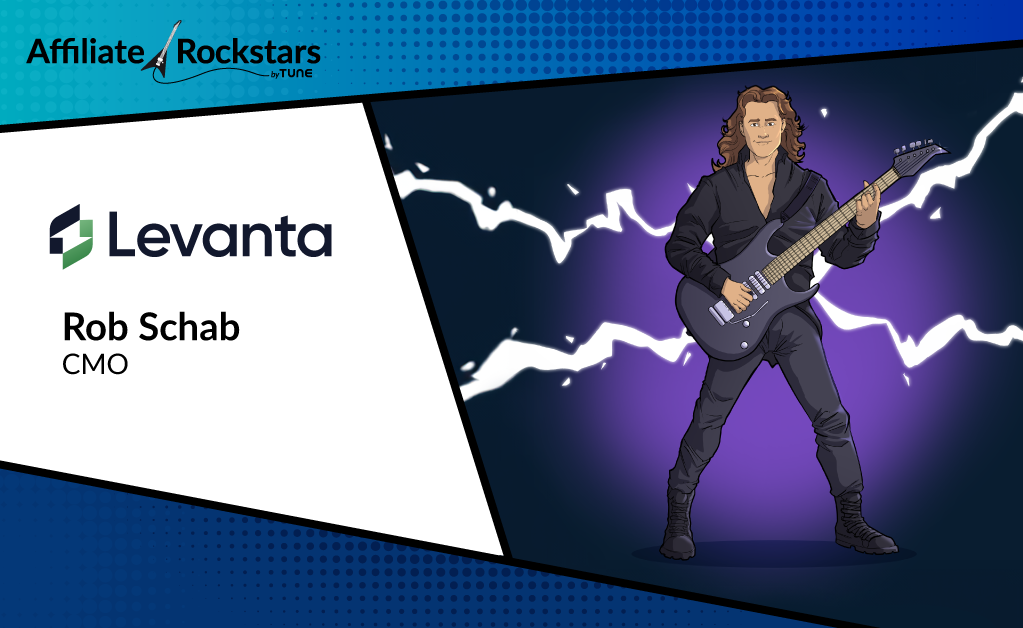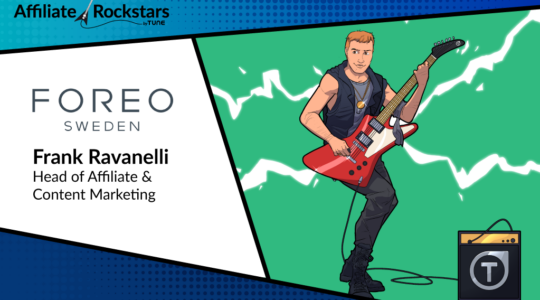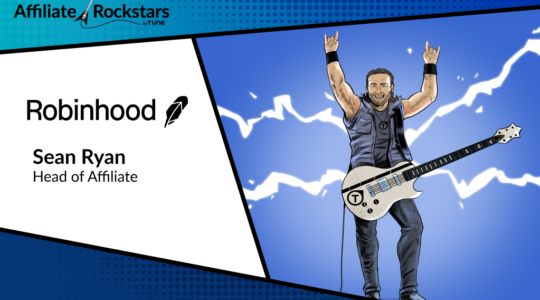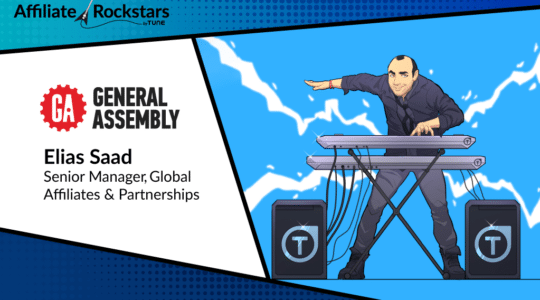
Introducing Rob Schab
Rob Schab is our first former TUNEr to become a certified Affiliate Rockstar! Since his days at TUNE, Rob has co-founded two affiliate technology companies. In 2020, Rob started an affiliate recruitment platform and agency called Grovia, which sold to Acceleration Partners. Today, Rob is the Co-Founder and CMO of Levanta, an affiliate platform for Amazon sellers. Rob is also a University of Washington alumnus, a reluctantly obsessed Seattle Mariners fan, and an avid traveler.
Take it away, Rob!
Rockstar Q&A with Rob
What are your day-to-day duties?
As Chief Marketplace Officer, my day-to-day is a healthy balance of strategy and execution around anything that increases the value of Levanta’s Amazon Affiliate network. Whether that is onboarding more brands through sales and partnerships, or building a recruitment strategy to activate creators at scale, my goal is to maximize marketplace activity.
How did you get into the affiliate industry?
Following a couple of valuable startup failures in college, I was lucky to get my first real job at an incredible company called TUNE (I still call them HasOffers). I had the best mentors that an affiliate rookie could ask for in Nate Ivie, Nessa Voigt, and Connor Sliva.
What are your most important KPIs?
With revenue being the ultimate KPI, my goal is to grow both sides of our affiliate network to encourage more transaction volume, hence generating more revenue. At a high level, we look at the number of active affiliates, and the number of advertisers (i.e., sellers). Meanwhile, we keep a close eye on SaaS revenue growth and retention rate.
What is your biggest pet peeve about the affiliate industry?
The fact that the majority of affiliate programs are last-click and measure down-funnel affiliates (e.g., coupon, loyalty, cash back) right alongside content and influencer affiliates. These two groups have completely different levels of incrementality and should not be competing for attribution. With improvements in affiliate tech, such as multi-touch attribution, sophisticated attribution models are becoming more commonplace. But there is still a lot of work to be done!
What do you think is undervalued in marketing in general?
The use of LTV as a meaningful metric. So many brands (especially in affiliate) are aiming to profit on their initial customer acquisition. Affiliates aren’t just driving sales, they are driving new customers. If you truly believe in your products, your brand, and your ability to create returning customers and referrals, you should be willing to pay affiliates a percentage of LTV, not just percentage of sale! Same logic applies to setting a target CAC in other marketing channels.
What are some of the things that you or your advertisers might do differently during the holiday season?
Prime Day is a critical stretch and essentially a holiday for Amazon sellers, and consequently a massive opportunity for Levanta. During Amazon deal days and other big shopping events, we become very deal-focused. We provide tools for our advertisers to share deal details with affiliates, and conversely, for affiliates to obtain deal information at scale. Our marketplace provides a catalog where affiliates can browse product/deal information, drill down into specific product categories, and sort by commission/price/best seller ranking.
What’s the next big thing in affiliate marketing?
You probably saw this answer coming, but there is no doubt that affiliate programs for marketplace sellers will make a big splash in the affiliate world.
But I’d also keep a close watch on AI. I saw a really interesting article from Neil Patel on SEO for ChatGPT. When will we see paid ads in ChatGPT … or affiliate links?
What are 2-3 trends you’re seeing in the affiliate industry?
The impact of AI on content and affiliate marketing. No doubt that AI is going to change the way that we create and consume content. I’ll also be curious to follow regulatory responses around AI, content, and commerce.
I sound like a broken record, but I think the biggest trend will be affiliate marketing for marketplaces. Amazon alone accounts for nearly 40% of U.S. e-commerce. Until recently, the millions of Amazon sellers had no solution for tapping into affiliate marketing as a scalable revenue stream. Keep an eye on Levanta and the fast-growing Amazon Affiliate ecosystem.
What’s your top tip when it comes to negotiating affiliate deals with partners?
Be empathetic, open-minded, and analytical! Most incremental-revenue-driving affiliates will know their value and will not always want to work on a commission-only model (the same reason sales executives don’t work on a commission-only model). Be willing to be flexible on your payout model and find a plan that works for both parties. Do your best to uncover metrics like expected views/clicks, then factor in things like conversion rate and LTV to calculate the potential earnings from the affiliate deal. From there, finding a balance between CPA, CPC, or flat fee that will satisfy the needs for both parties.
How important is it to follow the journey of a user after your advertisers first acquire them or after their first purchase?
Incredibly important. If nothing else, it is absolutely essential to have a good read on customer LTV. This would help determine how much you are willing to spend to acquire a customer. You can also leverage your customer journey insights to get feedback and improve your product, increase upsells/cross-sells, and generate more referrals.
Do you think you have what it takes to be an Affiliate Rockstar? Apply or nominate someone today.

Author
During his time as VP, Business Development at TUNE, Nate spearheaded the Affiliate Rockstars series, which aims to highlight the hard-working individuals in the industry and share their expertise with a wider audience. Nate received his BA in Social Sciences from Washington State University.



